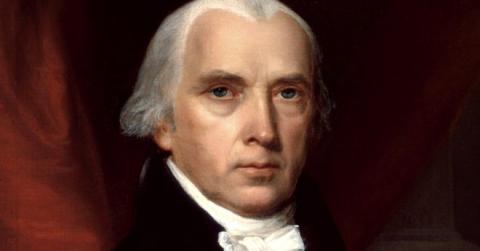One of the most common arguments in contemporary political discourse goes something like this: "We should devolve as much power as possible to state and local governments because they do things better than the federal government, and because they are less likely to misuse their power, and because the Founding Fathers understood all of this and wrote it into the Constitution." Is this correct?
Well, kinda-sorta-maybe. As is so often the case, this third assertion depends on which Founding Fathers we are talking about. Patrick Henry, Luther Martin, Samuel Adams, Robert Yates, and the other “anti-Federalist” Founders certainly saw states as bulwarks against federal tyranny--which is why they opposed the new Constitution. However, the Founders who supported the Constitution—such as James Madison, Alexander Hamilton, and John Jay (the authors of the Federalist Papers)--saw things a bit differently. And thus, the most eloquent rebuttal of the “states-are-defenses-against-tyranny” theory of Federalism ever written is James Madison’s magisterial Federalist #10.
The primary purpose of Federalist #10 was to counter the recent assertion of Anti-Federalist John Yates—a former convention delegate who spearheaded the opposition to the Constitution under the pseudonym “Brutus”—that geographically large countries like the United States were too big to function as Republics and must therefore always lapse into a tyranny born out of administrative necessity. Using ideas that he had initially worked out on the floor of the Constitutional Convention, Madison crafted his first contribution to the Federalist Papers around the revolutionary proposition that only a strong national government could control what he called “the violence of faction.”
For Madison, a “faction” was something like what we would call a “special interest group” today—a collection of individuals, either in the majority or the minority, “who are united . . . by some common impulse of passion, or of interest, adverse to the rights of other citizens, or to the permanent and aggregate interests of the community.” Among the potential factions in the United States, Madison mentions religious sects, supporters of paper money, and advocates for the equal division of property. He believed that the tendency to form factions lay deep within human nature and that, “as long as the reason of man continues fallible, and he is at liberty to exercise it, different opinions will be formed.”
Madison saw factions as a non-negotiable, non-preventable byproduct of freedom. No truly free society can keep factions from forming or to prevent them, once formed, from trying to advances their agendas at the expense of other people’s rights. As long as a faction does not constitute a majority within a nation, then the rule of the majority will ultimately keep them in check. However, when a faction becomes a majority in a democratic society, it gains the ability to impose its will on a minority. And this, Madison believed, was the greatest threat to freedom that a republic faced.
In Federalist #10, Madison proposes a way to solve this problem and, in the process, offers a brilliant rebuttal to both Brutus’s argument and Montesquieu’s political theory. The way to prevent a permanent majority from forming, he argues, is to make sure that the republic is large enough to contain so many factions that none of them can ever stay in the majority for very long:
The smaller the society, the fewer probably will be the distinct parties and interests composing it; the fewer the distinct parties and interests, the more frequently will a majority be found of the same party. . . . Extend the sphere, and you take in a greater variety of parties and interests; you make it less probable that a majority of the whole will have a common motive to invade the rights of other citizens; or if such a common motive exists, it will be more difficult for all who feel it to discover their own strength, and to act in unison with each other.
With this single masterstroke, Madison takes one of the Constitution’s greatest perceived weaknesses and turns it into a powerful strength. A large republic such as the United States will contain so many different factions, parties, and interest groups that none of them will ever predominate. Temporary coalitions between different interests will form to pass certain issues, but they will be continually forming and dissipating, making it almost impossible for a single faction to seize power long enough to damage the rights of the minority.
For Madison's idea of a republic to work, the primary guarantor of liberty in a free society must be a centralized government with more authority than its constituent units—for only such a government is capable of resisting the majoritarian impulses that have always plagued democratic societies (and, in 1787, were rampant in the former 13 colonies). Ironically, this places Madison directly at odds with many in the 20th century who call themselves “Madisonians.”
